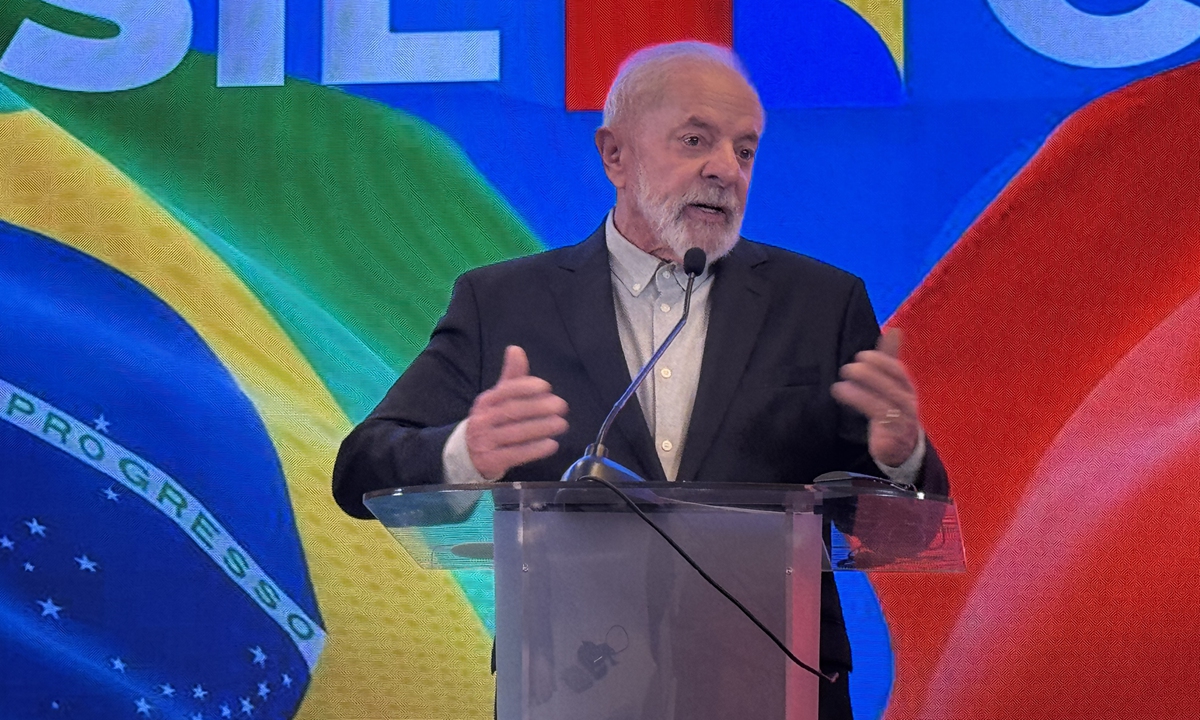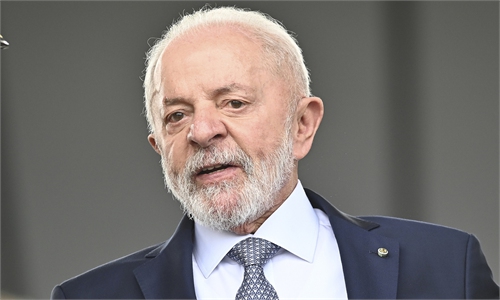We don't need a ‘big boss’ or a ‘world policeman’, rather an equal partnership, says Brazilian president in Beijing

Brazilian President Luiz Inacio Lula da Silva attends a press conference on Wednesday in Beijing. Photo: Zhao Yusha/GT
Brazilian President Luiz Inacio Lula da Silva said at a press conference on Wednesday that the Beijing Declaration brings hope, showing that economically strong countries like China are considering how to contribute to the development of the world's poorest nations. He also said that the world is different now, "We don't need a "big boss" or a 'world policeman'."
The fourth ministerial meeting of the China-CELAC (the Community of Latin American and Caribbean States) Forum was held in Beijing on Tuesday. The meeting adopted the Beijing declaration and the China-CELAC joint action plan for cooperation in key areas (2025-2027).
Chinese President Xi Jinping held talks with Lula in Beijing on Tuesday.
At the press conference on Wednesday, Lula said that the Beijing Declaration is an inspiration for developing countries in Latin America and the Caribbean.
The Beijing Declaration brings hope. It shows that economically strong countries like China are thinking about how to contribute to the development of the poorest countries, said Lula, also criticizing that "how long has the US not invested in Central America and Latin America? What about the European Union? Developed countries should consider learning from China's approach."
This marks Lula's sixth visit to China, and his second since 2023. Analysts suggest that this visit signals relations between China and Brazil have drawn closer further.
When asked if Brazil was concerned about retaliation from Trump administration for drawing closer to China, Lula said as a major country, Brazil has its own sovereign principles and positions.
Lula said he hopes that the US can understand Brazil's position and also hopes that Trump administration will not forget that the US has a huge trade surplus with Brazil.
"We don't need a 'big boss' or a 'world policeman'. What we want is an equal partnership," Lula said, when describing Brazil's approach to international engagement.
At the press conference, Lula also addressed the Russia-Ukraine conflict, saying he was optimistic that it could be resolved through political and peaceful means.
"Rather than shooting at each other, it's better to engage in dialogue and exchanges. In this way, fewer people will die and fewer children will be victimized. This is the value of diplomacy. For heads of state, the most important thing they should not lose is diplomacy. All the words related to 'dialogue' and 'consultation' in the dictionary should be fully utilized, and their value far exceeds that of a bullet," said Lula.
China and Brazil issued a joint statement on the Ukraine crisis on Tuesday, welcoming Russian President Vladimir Putin's proposal to initiate peace talks and Ukrainian President Volodymyr Zelensky's positive response.
The statement said that China and Brazil hope that Russia and Ukraine will begin a direct dialogue as soon as possible, which is the only way to end the conflict.
"The prospect of a possible agreement between Russia and Ukraine brings me relief. Peace can only be achieved through political means," Lula said, expressing the hope that more countries will join the "Friends of Peace" group initiated by Brazil and China at the United Nations to promote negotiations and reconciliation between Russia and Ukraine.
When talking about cooperation with China, Lula recalled a decision made 21 years ago.
In 2004, the then Brazilian government led by him recognized China's market economy status. He said that at that time, many people opposed recognizing China's market economy status, but he overcame the objections and made that decision. "Twenty years have passed, and I have never regretted it," he said. "Today, China is not only a role model for Brazil, but also for countries around the world. We need to study how China lifted 800 million people out of poverty. This is a miracle."
"China deserves to be regarded with more goodwill and less prejudice. China is a new force in the 21st-century in sectors of economy and technology," he said.
Lula described the present day as the most turbulent period since World War II, and some countries are abusing protectionist measures to undermine the stability of international trade. Against this backdrop, Brazil will, together with China, safeguard multilateralism, oppose protectionism, and promote free trade.
"When I return to Brazil, I will be more optimistic than before I came to China. I am more confident in the possibility of peace, more confident in economic growth, and more confident in the prospects of Chinese investment in Brazil," he said.


